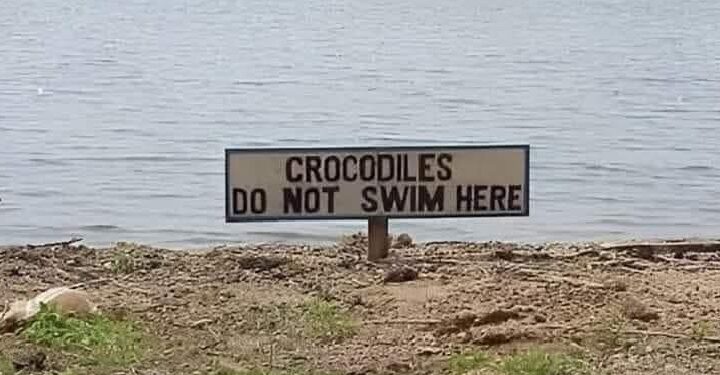How one missing comma can turn a harmless message into a deadly mistake

By Ibrahim Kegbegbe
It was just a signboard by the lagoon — five words in bold:
Crocodiles
Do Not Swim Here
It meant to warn swimmers. Instead, it sounded like a strict order to the crocodiles… and bad grammar can be deadly.
The intention was to warn swimmers to stay away from the treacherous waters teeming with crocodiles. But to a mind trained in grammar, the meaning could flip entirely. Without a comma or other clarifying punctuation, it reads as though someone is politely telling the crocodiles themselves, “Please, you reptiles, don’t swim here.”
It could also be read in another way: informing readers that this lagoon does not harbor crocodiles at all — suggesting the water is safe for swimmers. In other words, the sign could either save you from crocodiles or invite you to jump in, depending on how you interpret it.
That missing comma between “Crocodiles” and “do not swim here” transforms a life-saving warning into an ambiguous message. The correct form should have been:
Crocodiles, do not swim here!
This is the silent work of the grammatical assassin—not a person with a gun, but a careless or untrained hand that murders meaning through faulty mechanical accuracy.
Mechanical Accuracy: More Than Decoration
In the study of grammar, mechanical accuracy refers to the correct use of spelling, punctuation, capitalization, and formatting. These are not cosmetic flourishes—they are life-saving tools. A single missing comma can change the meaning of a sentence beyond recognition.
Consider this classic example:
Let’s eat, Grandma!
Let’s eat Grandma!
The first sentence is a warm invitation to share a meal with Grandma. The second is a horrifying act of cannibalism. The only difference is the comma.
When Punctuation Costs More Than Lives
Misplaced punctuation does not only send people to their early graves; it can also bury them in debt. In 2017, a court case in the U.S. hinged on the Oxford comma—that extra comma before the “and” in a list. A group of truck drivers successfully sued their employer for $5 million because the lack of a comma in a labor contract made the company’s interpretation of overtime pay ambiguous.
Street Signs, Shop Boards, and Silent Threats
Across markets, streets, and public facilities in Nigeria, examples of mechanical inaccuracy abound:
“No Parking Violators Will Be Towed” — Without punctuation, it sounds as though violators themselves will be towed away.
“Children Drive Slowly” — Is this telling children to drive slowly, or telling drivers to slow down for children? A comma after children would have saved the confusion.
“Beware Pedestrians Crossing” — Without proper punctuation, this reads like pedestrians are dangerous predators.
10 Deadly Punctuation Mistakes and Their Consequences
1. Let’s eat, Grandma vs Let’s eat Grandma
Missing comma = cannibalism instead of a family meal.
2. Crocodiles do not swim here vs Crocodiles, do not swim here
One warns people; the other instructs crocodiles.
3. No Parking, Violators Will Be Towed vs No Parking Violators Will Be Towed
One warns drivers; the other threatens to tow the violators themselves.
4. Slow, Children Crossing vs Slow Children Crossing
One tells drivers to slow down; the other suggests the children are slow.
5. Beware, Pedestrians Crossing vs Beware Pedestrians Crossing
One warns drivers to look out for pedestrians; the other warns pedestrians are dangerous.
6. A woman without her man is nothing vs A woman: without her, man is nothing
Punctuation shifts the meaning from sexism to admiration.
7. Let’s go, team! vs Let’s go team!
One is a cheer; the other is an instruction to go “team” somewhere.
8. The student, said the teacher, is brilliant vs The student said the teacher is brilliant
One quotes the teacher; the other reports the student’s opinion.
9. I like cooking, my family, and my pets vs I like cooking my family and my pets
One lists hobbies; the other describes horrific culinary habits.
10. We’re going to learn punctuation, not ignore it vs We’re going to learn punctuation not ignore it
One has clear contrast; the other is confusing and flat.
READ ALSO:Tinubu’s Economic Reforms Working, Nigerian Economy Stable — Okonjo-Iweala
More Nigerian Signboard Blunders:
1. “Do Not Urinate Here, Fine ₦500” — Painted on a wall, but without a comma after here, it reads as though you are being fined for not urinating.
Photo: A peeling wall in Lagos with the warning in red paint.
2. “Eatery Open 7 Days Weak” — A typographical error turns “Week” into “Weak,” unintentionally insulting the restaurant’s own stamina.
Photo: A roadside buka signboard in Ibadan.
3. “No Hawking Allowed, Arrest” — Sounds as though the arrest itself is allowed, not the hawking.
Photo: A metal sign in a Lagos bus park.
4. “Beware of Dogs, God Bless You” — Mixed tone: a warm blessing tucked inside a deadly warning.
Photo: A compound gate in Port Harcourt.
5. “Parking for Chief Only, Offenders Will be Persecuted” — “Persecuted” instead of “prosecuted” changes the meaning from legal punishment to religious oppression.
Photo: A private compound in Abuja.
Why Students of Grammar Must Take Note
For students, journalists, sign makers, and everyday communicators, the lesson is clear: words alone are not enough—how they are arranged and punctuated determines whether your message will save or destroy.
Mechanical accuracy is not a luxury for language purists; it is a necessity for safety, clarity, and credibility. The crocodile signpost is more than a funny example—it is a deadly reminder that in writing, a misplaced or missing mark can make the difference between life and death.
READ ALSO:From London to America: Pasuma’s Promise to Tiri Leather Fulfilled
Final Word
Next time you write a sign, a contract, or even a WhatsApp status, remember: punctuation is not decoration—it is navigation. A single dot or curve can mean the difference between warning swimmers about crocodiles, warning crocodiles about swimmers, or assuring swimmers that crocodiles aren’t even around.
READ ALSO:How Ex-Provost Secured TETFUND, BPP Approval to Fence Private Estate Under False Pretext
If you doubt it, just ask Grandma… after you’ve placed the comma.

















